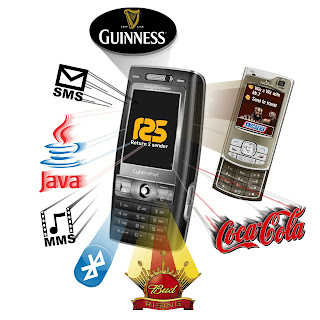FROOPDOOPI

Sunday, November 14, 2010
Success factors for mobile commerce ^^
Mobile commerce is an emerging market. Therefore, there are significant opportunities and risks. The temptation at this stage is for key players to impose their own rules based on their own business models.
Although this can be beneficial for a few in short-term and in some markets may be the only way to start doing mobile commerce, in the long-term this will have a negative impact on business because lack of interoperability and higher operating costs will create barriers to growth and adoption. However a dynamic market needs an environment that favours innovation and diversity of stakeholders.
This section defines four success factors which are key to making mass mobile commerce happen across the world:
1. Innovative business model. Companies that want to take advantage of the opportunities presented by this new technology will have to understand how this technology fits with existing business models.
Retailers and manufacturers have to consider that they have the opportunity to become providers of services as well as providers of products.
Mobile Network Operators need to consider how mobile commerce can be integrated with existing tools for revenue generation such as SMS and MMS as well as the huge potential to drive data traffic.
Mobile Phone Manufacturers need to consider how to provide mobile devices that suit the needs of the market but also drive the market in new directions.
Solution Providers need to understand how to collaborate with different players.
2. Consumer adoption. Mobile phones are already starting to become a basic device available to everyone anytime, anywhere.
For mass adoption of this technology to take place quickly, consumers must:
Be able to access services as easily as possible
Be convinced that the services are useful and make a difference in their lives
Be confident about the costs of these services
Be confident about the source and reliability of the information delivered
Be confident about respect of privacy and personal information
Be confident that security measures protecting their devices are effective.
For consumers to adopt any of these new services on their mobile phones confidently, they need to be able to use these services whatever kind of mobile phone they buy, whatever kind of subscription contract they have signed and whatever mobile network operator they have choosen.
For service providers, this means that choices need to be made to support interoperability and openness, rather than to develop and use private model. Business model need to be developed to make sure this is possible.
Once there is global, interoperable platform available, service providers will be able to focus their resources on creating and launching new services or on transferring existing services to mobile devices, all based on system that is trusted by consumers.
3. Technology availability. Without certain technology mobile commerce is impossible. The full potential of the mobile phone as an ubiquitous object is only released when local interaction technologies are embedded, such as the combination of camera and image recognition software and ways of exchanging and communicating wireless information with products, point-of-sale and other devices. The integration of the secure element, such as a tamperproof chip card, inside the mobile phone will provide security and trust for handling valuable data.
Support for high quality display of the information to the users, supporting state of art internet technologies are required to provide a satisfying and consistent user experience.
4. Interoperable system. Interoperable systems are essential to mass adoption of mobile commerce. Through proprietary systems may function well in limited situations, they are a barrier to any large-scale implementation.
Mobile marketing :)
Mobile marketing has potential to fundamentally change the way consumer marketing occurs. Instead of a campaign-based approach, there is a shift towards a dialogue where consumers are willing to share information and marketers can make use of that information in a more valuable way. Throughout the history, businesses build up a relationship with consumers in which each considers the other as a trusted party. Four key factors distinguish mobile marketing:
Permission-based(form of mass marketing, consumers need to give their permission before being marketed to).
Targeted (by agreeing to share information about themselves and their buying habits, consumers allow businesses to improve the relevancy of the offers they send out).
“Live” (due to nature of mobile phones, responses can be processed to give real-time visibility of reaction to specific offers).
Two-way (using mobile devices, consumers can not only respond to offers but also request specific types of information or interest as well as sharing information with their mates).
Mobile has remained a much more trusted channel than email. Very strict rules have regulated marketing to mobile phones. As a result, spam is not a problem in the same way that it is for emails.
The main feature that differentiates mobile marketing from other channels is the ability to send the right message to the right person at the right time and so trigger a better response rate. Even though other channels can reach highly targeted groups, there is a little control over time.
Mobile commerce vs ecommerce
Internet plays a huge role in history of communication making its own contribution to the way that businesses do business and the way that consumers interact with businesses. Businesses automated many processes from ordering to customer service. A clear example is the way that spending on advertising is already shifted from traditional off-line media to online and digital media.
Mobile commerce refers to ecommerce but in more personalized way available to a wider audience. Moreover, m-commerce defines to the opportunity to connect information with objects in more direct way than has been possible until now.
What is special about mobile phones is the fact that they have massive adoption globally. Many more people have access to mobile phone that to a computers and this means that m-commerce has the opportunity to connect not just big businesses but also small business and consumers on a massive scale. In this case, mobile phones have the potential to bridge the digital divide and allow organizations and individuals to reach out to one another more easily than ever before.
We are moving into a world where digital goods are becoming as important as physical goods. Due to the internet, value is created not just by goods themselves but by the exchanges of those goods. Organizations that can make easier that exchange have a notable competitive advantage in this networked world.
Mobile commerce refers to ecommerce but in more personalized way available to a wider audience. Moreover, m-commerce defines to the opportunity to connect information with objects in more direct way than has been possible until now.
What is special about mobile phones is the fact that they have massive adoption globally. Many more people have access to mobile phone that to a computers and this means that m-commerce has the opportunity to connect not just big businesses but also small business and consumers on a massive scale. In this case, mobile phones have the potential to bridge the digital divide and allow organizations and individuals to reach out to one another more easily than ever before.
We are moving into a world where digital goods are becoming as important as physical goods. Due to the internet, value is created not just by goods themselves but by the exchanges of those goods. Organizations that can make easier that exchange have a notable competitive advantage in this networked world.
Subscribe to:
Comments (Atom)




